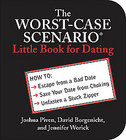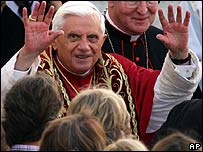
Saint Paul's Cathedral, London
My comments are after the religionfacts.com article.
Used by permission from
http://www.religionfacts.comhttp://www.religionfacts.com/christianity/features/new_testament_manuscripts.htm The Importance of Ancient Manuscripts
As seen in the section on Christian texts, the New Testament plays a very central role in Christianity. For most Christians, the New Testament is not only a precious record of the life of Jesus and the apostles, but a divine revelation to mankind on matters of salvation. Christians of all denominations consider the Bible to be the primary authority in determining doctrine, ethics, church structure, and all other religious issues.
This strong reliance on the New Testament is based in part on the religious belief that it was divinely inspired. But it also based on the belief that it is an accurate historical record written by eyewitnesses (and associates of eyewitnesses) who experienced the lives of Jesus and the apostles firsthand. But some have challenged this traditional view, arguing that it was written much later, long after Jesus' original followers were dead and Christianity had transformed into a different religion than the one taught by Jesus of Nazareth.
The debate really comes down to the question: When was the New Testament originally written? And this question leads to another important question: Even if it was written at an early date, how do we know the New Testament that exists today is the same as the original? How do we know the modern translations aren't full of human errors, additional content, or the interpretations of countless human scribes?
Both of these questions are answered within the fields of paleography and textual criticism, which seek to analyze ancient manuscripts of the New Testament to determine their date and accuracy.
The article that follows provides an overview of the most important New Testament manuscripts that have been discovered and outlines the process used to analyze those manuscripts.
The Role of Textual Criticism
No original manuscripts of the original Greek New Testament have been found. However, a large number of ancient manuscript copies have been discovered, and modern translations of the New Testament are based on these copies. As one would expect, they contain some scribal errors. In fact, "there is not a single copy wholly free from mistakes."
It is the task of textual criticism, therefore, to study and compare the available manuscripts in order to discern which of the variations conforms the closest to the original. Bruce Metzger of Princeton University, a prominent modern textual critic, describes the role of textual criticism this way:
The necessity of applying textual criticism to the books of the New Testament arises from two circumstances: (a) none of the original documents is extant, and (b) the existing copies differ from one another. The textual critic seeks to ascertain from the divergent copies which form of the text should be regarded as most nearly conforming to the original. In some cases the evidence will be found to be so evenly divided that it is extremely difficult to decide between two variant readings. In other instances, however, the critic can arrive at a decision based on more or less compelling reasons for preferring one reading and rejecting another.
Paleography: Dating Ancient Manuscripts
Of course, the reliability of a given manuscript is based in large part on its age: earlier manuscripts are more likely to be accurate reflections of the original, so they are given more weight than later copies. It is therefore important for textual critics to know the dates of the manuscripts they are analyzing.
Interestingly, carbon dating and other chemical methods are rarely used in determining the age of manuscripts. Instead, a paleographer analyzes the handwriting of the text, which yields a much more precise date than carbon dating would. A paleographer "cannot establish the exact date but he can confidently place one handwriting in the 30's and another in the 80's."
The Earliest Extant Manuscripts
Fortunately, textual critics and paleographers have a large number of ancient manuscripts at their disposal, many of which have been found within the last century. Nearly the entire New Testament exists in manuscripts dated to before 300 AD. Other important manuscripts date to the fourth and fifth centuries.
The manuscripts dating from 100 to 300 AD are almost entirely papyrus fragments. These fragments are named with a "P" followed by a number. The vast majority of them were found in Egypt in the twentieth century, and are now kept in various museums and libraries throughout the world, including at Dublin, Ann Arbor, Cologny (Switzerland), the Vatican and Vienna.
The earliest manuscript of the New Testament was discovered about 50 years ago. P52 is a small papyrus fragment of the Gospel of John (18:31-33 on the front; 18:37-38 on the back), and it has been dated to about 125 AD. This makes it a very important little manuscript, because John has been almost unanimously held by scholars to be the latest of the four gospels. So if copies of John were in circulation by 125, the others must have been written considerably earlier. Moreover, the Gospel of John's greater theological development when compared with the other three gospels has led some scholars to conclude it was written as late as 120 or even 150 AD. The P52 fragment seems to make such late dates impossible.
In addition to the early papyrus fragments, a large number of parchment manuscripts have been found that date from 300 AD onward. These are usually named for the place in which they were discovered and are abbreviated by a letter or sometimes a number. The manuscripts A/02 (Codex Alexandrinus), B/03 (Codex Vaticanus), and Sin./01 (Codex Sinaiticus) contain nearly complete sets of the New Testament. By comparing these to the earlier papyrus fragments, they have been shown to be quite reliable.
Codex Vaticanus (B), the earliest of the great parchment manuscripts at about 300 AD, has resided in the Vatican since the middle ages and remains there today. It is one of the most important manuscripts for textual criticism.
Codex Sinaiticus (Sin.) dates to about 350 AD. It was discovered in 1844 in a monastery on Mount Sinai by a Russian. After some resistance, he persuaded the resident monks to allow him to take it to St. Petersburg. On Christmas Eve, 1933, the Soviet government sold it to the British Museum for 100,000 pounds. It was put on permanent display in the British Library, where it still resides, along with other early biblical manuscripts.
Codex Alexandrinus (A), dating to circa 450 AD, was transferred from the Christian library in Alexandria to the British Library in the seventeenth century, where it still resides today. The Catholic Encyclopedia details its history:
Codex A was the first of the great uncials to become known to the learned world. When Cyril Lucar, Patriarch of Alexandria, was transferred in 1621 to the Patriarchate of Constantinople, he is believed to have brought the codex with him. Later he sent it as a present to King James I of England; James died before the gift was presented, and Charles I, in 1627, accepted it in his stead. It is now the chief glory of the British Museum in its manuscript department and is on exhibition there.
British Museum Pamphlet on the Codex Sinaiticus
Philip W. Comfort, The Text of the Earliest New Testament Greek Manuscripts.
C.C. Edgar, Select Papyri.
Bruce M. Metzger, The Text of the New Testament: Its Transmission, Corruption, and Restoration (1992). Full text is available online at Questia Online Library.
Bruce M. Metzger, Manuscripts of the Greek Bible: An Introduction to Paleography.
E.G. Turner, Greek Manuscripts of the Ancient World (1987).
G. Cavallo & H. Maehler, Greek bookhands of the early Byzantine period, A.D. 300-800 (1987).
Leighton Reynolds, Scribes and Scholars: A Guide to the Transmission of Greek and Latin Literature.
C.H. Roberts, Greek Literary Hands (1956). On the dating of manuscripts with the aid of contemporary documents.
J. Finegan, Encountering New Testament Manuscripts: A Working Introduction to Textual Criticism (1974). W.H.P. Hatch, The Principal Uncial Manuscripts of the New Testament (1939).
H.J.M. Milne & T.C. Skeat, Scribes and Correctors of the Codex Sinaiticus (1938).
D.C. Parker, Codex Bezae: An Early Christian Manuscript and its Text (1992). On the idiosyncratic manuscript D.
C.H. Roberts, Manuscript Society and Belief in Early Christian Egypt (1979).
G. Zuntz, The Text of the Epistles (1956): on P46
This article is helpful as it provides a scholarly, objective perspective on the issue of New Testament manuscripts. I am a philosophical theologian working on finishing his PhD, and I do not claim to be an expert of the origin of New Testament texts, however, here are some of my thoughts based on this article.
The divine inspiration of Scripture was noted as important. The New Testament is not full of mythological stories of clearly fictional characters, but actual people that existed. The same group of people discussed within the New Testament, is also the group that produced the Scripture. Therefore, the New Testament is historically grounded on eyewitness testimony, and associates of eyewitnesses.
Since every manuscript contains scribal errors, we can conclude the copies are not equal to the original inspired letters. This does not mean that we have to abandon the Biblical idea of inspired Scripture. I firmly hold to the concept of 2 Timothy 3:16 that all Scripture is inspired by God for teaching, and training. I think we can deduce that scribal errors do not equate with theological errors, and therefore scribal errors do not eradicate or change the New Testament’s essential doctrines. There are enough New Testament documents extant that scholars would know if certain schools of manuscripts contained serious differences in theology from other schools. This is why as Christians we do not need to take seriously the claims of critics that state that lost or hidden New Testament era documents from the group of eyewitnesses contradict the ones found in the New Testament. The manuscript evidence supports the fact that there are scribal errors in the documents, but does not support the idea of major theological differences between different groups of manuscripts.
My theory of inspiration would include the idea that God inspired the original New Testament documents written by those within the group of Christ and the Apostles. Since the documents would eventually physically disintegrate, God would have to use supernatural means to maintain the original documents. The idea of God using some kind of supernatural force field to maintain the documents as good as new does not seem in line with how God works in our world over a long period, and so it is not surprising that God allowed the originals to be destroyed or lost, and instead maintained his Scripture through copying. The copying mistakes did not affect any major doctrine, but we do have related issues like with the ending of Mark.
Mark 16: 9-20 does not appear in Codex Vaticanus (B),or Codex Sinaiticus (Sin), the two oldest groups of manuscripts. Marlowe (2006: 1). The manuscripts have Mark ending at 16: 8. However, 16: 9-20 does appear in Codex Alexandrinus (A), which is a slightly newer manuscript. Miller (2005: 1).
It is possible a scribe or scribes added 16: 9-20, which became part the majority of New Testament texts, but it does not change the essential message of the Gospel or New Testament. We have copies from the two older groups of manuscripts which allow scholars to speculate that it is possible that Mark 16: 9-20 was not written by Mark, but written by a scribe at a later date. God has therefore not allowed a corruption of New Testament theology at its core even if he did allow an uninspired scribe to write 16: 9-20 and allowed it to become part of the majority text. It is also possible that Mark died and God inspired an associate who had known Mark to complete the book which appears in the majority text.
My essential Christian theology is not changed whether or not Mark ends at 16: 8 or 16: 9-20. If Mark died and the book ended at 16: 8, I do not see any need to place demands upon the Markan text and state that it had to have contained an actual resurrection appearance. The ending of the book does make it clear that Christ was no longer in the tomb and was resurrected. The tomb was empty, and a man, likely of supernatural origin in 16: 6-7 made it clear that Christ had risen. My hope is that a scribe or scribes did not think that the lack of a resurrection appearance and an abrupt ending meant that another ending had to be created. My New American Standard Bible has two different additional endings after 16: 8. However, if endings were added by scribes, God has still provided the Church with evidence of this from Codex Vaticanus (B),and Codex Sinaiticus (Sin). The Church could therefore take anything stated in these verses as less than Biblically authoritative, but these verses do not influence major Christian doctrines. I therefore can view our present New Testament as an essentially accurate copy of the original inspired word of God.
Marlowe, Michael D. (2006) ‘Mark 16: 9-20’, Bible-Researcher.com, Ohio.
http://www.bible-researcher.com/endmark.htmlMiller, Dave (2005) ‘Is Mark 16: 9-20 Inspired?’, Apologetics Press.org, Montgomery, Alabama.
http://www.apologeticspress.org/articles/2780

















